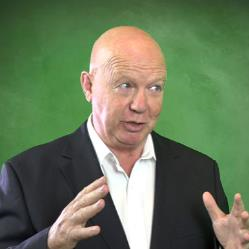 "A renaissance sales manager helps their people become magnificent" - Interview by John Smibert
"A renaissance sales manager helps their people become magnificent" - Interview by John Smibert
Renaissance means cultural rebirth - new growth of activity or interest - particularly in the arts.
 In this discussion Sue Barrett states that sales managers need to be renaissance managers.
In this discussion Sue Barrett states that sales managers need to be renaissance managers.
Sue talked about sales managers of the 1960's and 70's and how the good ones were stweards of their people. They cared for their people, were out there with them, doing the training, doing regular coaching, getting people together in huddles. They were consistently looking at how individuals can develop and adjust and really be successful out there. They weren't so tied up in management and administrative activity and internal issues.
Sue explains sales managers should want their salespeople to evolve and become magnificent. A manager should be able to look at each person individually and actually help them find that path to magnificence. .
See the full discussion below where Sue explains how you can help your people become magnificent.
Sue is an authoritative thought leader and an accomplished author on the selling profession. She's also founder and CEO of Barrett and SalesEssentials.com.
Interview
John: Again I'm delighted to have Sue Barrett with me - welcome back, Sue!
Sue: Thank you, John!
John: Hey Sue, we talked about the salesperson being a curator in our last discussion, and I loved the discussion - thank you very much. I've also heard you talk about sales managers as being the Renaissance sales manager, and I think I like the concept where the sales managers have to get back to the old type of sales manager. Tell me what you really mean.
Sue: Yes. We have a bit of an art thing going on, don't we? The curators and Renaissance and those sorts of things.
John: [laughs] You've obviously got an interest in art by the sound of it!
Sue: Just a wee bit. My father gave me a book not long before he died circa 1960, called How to Hire and Manage Your Salesmen. Now, okay, the title was a wee bit sexist, but in there it was all about caring for your people, caring for your salespeople, but also being out there with them and doing the training, doing regular coaching, getting people together and looking at how we can keep it continuing to develop and adjust and really be successful out there. When I look at that book, a lot of the common sense that was in there is what we need today.
John: I remember we had a discussion last year some time, where you talked about the fact that we invest so heavily in our salespeople and their training and development that sometimes we forget the sales managers. So, you're really saying, "Hey, let's get back to sales managers being true sales managers, and not the spreadsheet guy or the forecasting guy or the manager up, and let's go and spend some time with our salespeople."
Sue: Absolutely. We do need to look at the numbers, but we also have to appreciate too that the numbers themselves will never be a linear process and they'll never be 100% predictable. The way you're going to know about what's actually going on out there, if it's true, is being out with your people, and making sure that you're there to support them but also to be able to challenge them when they might be getting a bit down or they're looking at things from perhaps a perspective that's not helpful. So, we're there to really guide and help them along the way.
As I said, sales managers were the chief training manager of their people back in the 60s and 70s, they were the person out there making sure that there was regular get-togethers, huddles, call them what you will, but we were always looking at how... Like a sports team, always looking at how to be fit and healthy and...
John: And learning from each other and...
Sue: Exactly, and sharing and...
John: Encouraging each other and so on, yes. There's a question I'd love to get the answer to from your point of view, and that is what percentage of time should a sales manager - in their overall job - spend in the field or with their salespeople, versus doing management type tasks?
Sue: Okay. Well, the question we have to ask before that is how many salespeople should a manager actually be responsible for directly?
John: Well, that's going to vary from environment to environment, isn't it?
Sue: It is, it is, and it depends if they're full-time as well, because a lot of sales managers are also given sales targets to meet as well and this just creates lots of confusion. So, in small teams I can understand these hybrid roles, but a sales manager... you can successfully manage people about say 8 to 10 max.
John: I agree, I agree.
Sue: So around that number. How much time then should they be investing in their people out in the field and how should they help them? The rough split would be 60-70 percent in the field.
John: Right. I've heard others say work the 80-20 rule if you possibly can, but it's tough.
Sue: Yes, because they have got data to manage, they've got reports to... and they've got stakeholders to manage up and across, laterally as well, so they've got to have time to do that and they've got to have their own quiet time. Because a sales manager, a good one, is both analytical and empathetic, and they've got to be able to balance those two. They're a rare breed, and I think it's the hardest people management job going around.
John: I think it is. I've been there and done that, and sometimes I failed - it's a really tough gig. So, let's wrap this discussion up. What are the key things a sales manager has to think about to be a Renaissance sales manager then?
Sue: They need to make sure that they are there as leaders for their salespeople.
John: Emphasis on the word "leaders" versus manager.
Sue: Well, you manage things and you lead people. They've got to manage data and those sorts of things, but they're there as leaders of their team. They're also there as the ambassador for the organisation about the sales efforts of the business, so they have to be leaders. They also should make sure that they've got clear levels of accountability, that people actually understand what's expected of them, there's no hidey-holes, there's no confusion around that, and then be strong enough to hold people to account but in the way of actually helping people be successful.
John: Right.
Sue: It's that push and pull all the time, it's a dynamic; it's like parenting kids as well. I don't mean that in a patronising way, but you want people to evolve and become magnificent, and you've got to be able to look at each person and actually help them find that path to magnificence. So, you have to hold them to account, you have to be fair, you have to be clear, and above all you have to lead them, because they will want to work for you and produce those results if you're clear.
John: And I heard you say "fair" there. You need to be consistent across all the people. You can't have favourites and you can't have more time with one and not another if they both need it, and so on and so forth.
Sue: And you also have to be a respectful person. I won't say the term on this video, but you know a blog post I wrote just recently about derogatory terms people calling their salespeople, and I won't have any of that.
John: No, no.
Sue: I just won't tolerate crap like that.
John: In this day and age a sales manager needs to be a straight up and down person that really has great empathy with their people and uses the right sort of constructive words in the way they communicate with them, and nothing derogatory.
Sue: And the good sales managers back in the 60s and 70s... There were some crappy things there too, but the really good ones were these leaders and stewards of their people.
John: Yes. I can remember some great ones that I would follow to the end of the earth.
Sue: Yes, I can too, and we need more of them.
John: Fantastic - Sue, thank you very much for your advice! And to all the sales managers out there, be a Renaissance sales manager! Thank you!
Sue: My pleasure!
****************
Past interviews with Sue Barrett:
***************

Your Invitation: I invite you to join the Sales Leader Forum group on LinkedIn where you can experience informative discussions with your peers and sales thought leaders on subjects like the one we have discussed here. I also invite you to subscribe to the
- Sales Leader Resource Centre here
- Sales Leader YouTube channel here (300+ sales leadership videos)
Please Share: If you valued this article, please share via your Twitter, LinkedIn, Google+ and Facebook social media platforms. I encourage you to join the conversation or ask questions. So feel free to add a comment on this post - I promise to respond. If inclined please follow my LinkedIn post page here.
Want to touch base? If you have questions please feel free to contact me - email: john.smibert(at)salesleaderforums.com, Phone: +61 404857893 or Skype: john.smibert